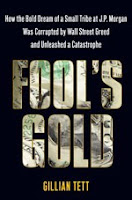Liar's Poker and The Big Short by Michael Lewis
To the extent that one can have physical affection for written words, I have a total crush on Michael Lewis' writing. Liar's Poker is about the Gordon Gecko culture of 80s Wall Street. Lewis was a fresh out of grad school, and had the good fortune to land a job at Salomon Brothers-- a major Wall Street bond trading firm, and the originators of the mortgage-backed security.* The Big Short is about the economic meltdown of 2008, as seen through the eyes of a handful of analysts who saw the disaster coming. Though they were written 20 years apart, when read together these books are an awesome chronicle of the rise and fall of the mortgage security market. Lewis has a real flair for personal details that keep the stories and real-life characters engaging and interesting, such that the books read like novels, even during detailed discussions on how bonds work.
*If Salomon sounds familiar, that's because they were the inspiration for The Bonfire of the Vanities, and Liar's Poker reads like a real-life version of that book. Except that Liar's Poker is well written, and enjoyable to read. (Oh yeah, I went there. Tom Wolfe is a hack.)
Fool's Gold by Gillian Tett
Another book about the 2008 crisis (this was my pet topic for a couple months). Though this book focuses on a small group at J.P. Morgan who began seriously innovating financial tools with names like credit default swaps and collateralized debt obligations (but who wisely exited the market when things started getting out of control), it also has a much broader scope, analyzing each of the big institutions like Bear Stearns and AIG. Fool's Gold is much more technical than Lewis' books, which is exactly what I was looking for-- I wanted a better understanding of these financial instruments, and how they inextricably link all of the major financial institutions. But she also lacks Lewis' knack for characterization and storytelling. Tett is a journalist at the Financial Times, and it shows in her writing; at times, Fool's Gold feels more like a really long news article than a book. I ended up returning it to the library before I finished it, but it's still worth a read if you're interested in a more technical look at '08.
The Coming of Conan the Cimmerian by Robert E. Howard
These stories are great! This is a collection of original Conan stories from Weird Tales, apparently presenting Howard's original drafts for the first time. (Published stories were frequently edited or stitched together by other authors.) I was surprised at how Lovecraftian these stories feel at times-- shapeless evils from the eternal void, etc. Of course, the difference here is that when Howard's protagonist encounters the nameless horror, he buries his broadsword in its noggin, instead of slowly descending into madness. Howard wrote for monthly magazines, so his stories are brief and often clearly tailored to his market (i.e. lots of gore and boobs), but still he writes with an elevated prose and a kind of kinetic force that makes it hard to put a story down until its finished. I'll definitely be revisiting Cimmeria soon.
Shadow of the Torturer by Gene Wolfe
I can't decide whether I like this book or not. But either way, Wolfe is an amazing writer. He makes brilliant use of unreliable narrator as a literary device. The book consists of the eponymous torturer recounting his life. He frequently references his supposed "perfect" memory, but frequently skims over events or even contradicts himself, so that you're constantly wondering whether he is exaggerating his abilities, glossing over events he finds unpleasant to speak about, or just out and out lying to you. What I like about this book is that the Narrator never goes out of his way to explain the world around him. He assumes that you are a denizen of that world, that you know what all of the things in it are, and that you don't need explanations for who is who or what the deal is with that guy, etc. For example, he frequently references "flyers," which are apparently some sort of fast transport, but never once does he describe them in any kind of detail. Because you if you lived in that world, you would just know. It could be an animal, or some kind of machine, or something else entirely. The book is like a kind of puzzle, and you're constantly putting together clues gleaned from context. (I of course love this, I have the kind of mind that is always hungry for puzzles, which perhaps explains my patience with sifting through the lengthy Appendices to LotR or the Codex in Mass Effect.) Wolfe never insults your intelligence; he assumes that you can keep up with what's going on. What I don't like about this book is that the pacing is agonizingly slow. Literally all that happens in this first book is that the main character gets kicked out of his guild, walks around the city for a while, and gets in a fight. That's it. Oh, and a confusing cliffhanger ending. Actually, now that I think about it, that's kind of funny-- maybe Wolfe is just messing with me. I think I'm going to give the next book in the series a try, if only because my curiosity is peaked and I want to find out what exactly is going on. Hopefully the pace will pick up soon; I still have no clue where this story is heading.




No comments:
Post a Comment